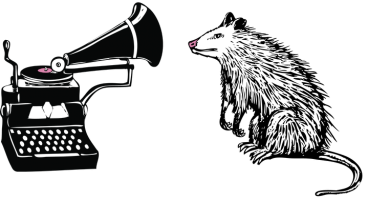Unpublished excerpt from the 2018 novel
by Chris Offutt
From Spring 2018
Jimmy picked Tucker up at the prison and drove highway 62 to the town of Princeton, where Tucker bought a long-barreled Colt .38 Police Special. A four-inch barrel would hide better, but Tucker liked the idea of wearing the same gun as lawmen. They stopped at a roadside diner called the Trixie Grill and took a booth, sitting in their jackets and hats, countrymen in town. Tucker ordered fried chicken, green beans, cornbread and coffee. Jimmy renewed his empty stomach with another breakfast.
Clad in a white dress, lightly stained from food, the waitress walked briskly away, nylons brushing her thighs with every step. Her dark hair was pulled back in a ponytail, the sides held by bobby pins tipped with plastic. Tucker couldn’t recall the last time he’d seen bobby pins, didn’t know he’d missed them. He watched her hips twitch. From the dormant region below his belt he felt a vague heat, a kind of stirring. He missed his wife.
Fastened to the end of the table was a glass-enclosed Rolodex operated by pushbuttons that presented an array of songs. Jimmy slid a nickel in a slot and pressed the greasy buttons. From a jukebox in the back of the diner came a raucous noise, as offensively distorted as men yelling in prison and clattering tin plates against the bars.
“What the hell is that?” Tucker said.
“Surfin’ Bird,” Jimmy said. “Bird is the word. It’s the Trashmen.”
“Turn it off.”
“Can’t. Ain’t no on or off to it.”
“Go over there and unplug it.”
Jimmy’s impulse was to object until he saw the grimness in Tucker’s eyes. He unfolded his lankness from the cramped booth, went to the back of the diner and kicked the jukebox. The needle hopped twice and reached the blank part of the disc. The music stopped as the mechanical arm lifted and swung to its place of rest. The waitress gave him a dirty look and he rolled his eyes to indicate Tucker hunched over his coffee. Jimmy returned, sliding across the swollen vinyl seat crisscrossed with tape.
“Happy now?” he said, and regretted speaking.
“Ain’t they got no Gentleman Jim Reeve?” Tucker said.
“He died.”
“Say he died?”
“Some kind of plane crash,” Jimmy said. “Can’t trust a plane.”
“What about Hank Williams?”
“He died, too. That old time shit’s done. Now it’s surf and folk and Motown. Want to hear it?”
Tucker shook his head.
“It’s cool,” Jimmy said as if he was testing a new word to go with his clothes, then repeated it with more confidence. “Cool.”
The waitress brought their meals on heavy ceramic plates and refilled their coffee. Tucker began eating in a methodical way, forearms on the table to guard his food, one hand holding the edge of the plate in case he needed a weapon. Six years he’d waited for cornbread and it was too dry. Worse, Hank was dead.
